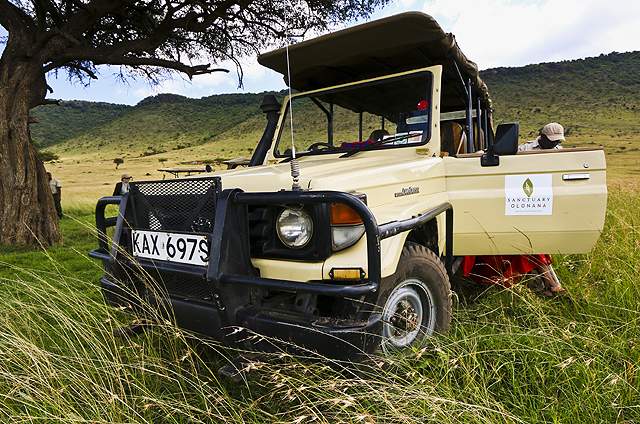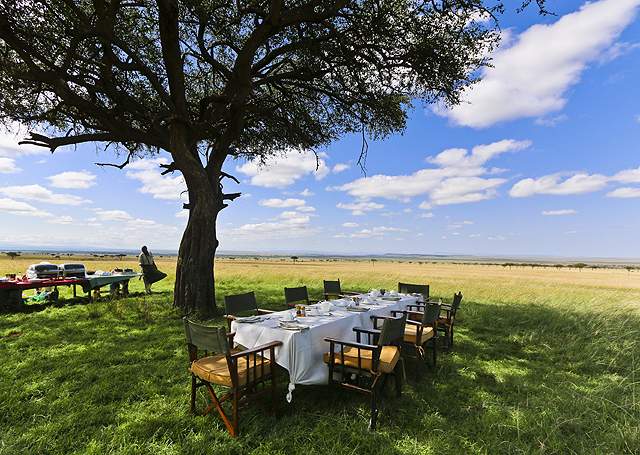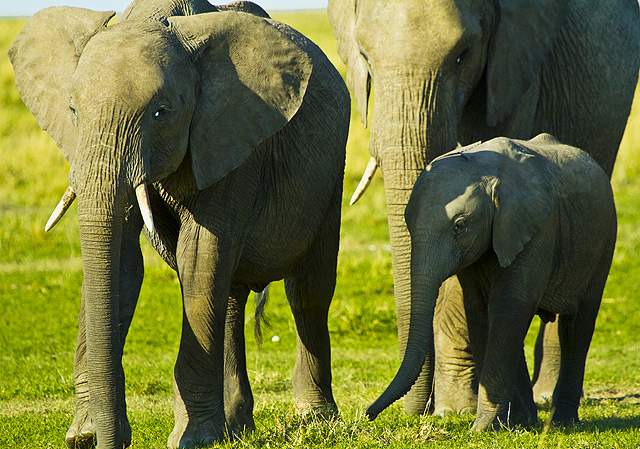Going on safari is one of those once-in-a-lifetime experiences, and many long-term travelers add an African safari to their list of pillars to plan their trip around.
But how do you go about planning your safari?
Quick tips
- In Kenya, you cannot go on safari on your own.
- Although anyone can go to the National Parks (for a fee), you need to pre-plan a safari.
- Camps recommend booking at least 3 weeks in advance, and preferably as soon as possible.
- Some camps have people make reservations 3 years in advance!
- There are no public lodgings near many national parks (like Amboseli and Maasai Mara). Therefore, you must book your safari with a safari company.
The good thing about this is your room, food and meals, guides and drivers, vehicles, park fees, gas, blankets, showers, and sometimes alcohol and laundry services are included in your price, making it easier to budget for in advance. And there are various styles of safari’s in a range of price levels.
No matter what kind of traveler you are, or what budget you have, there is a safari for you.
If you have always wanted to go on a Kenyan safari, these steps will help you plan your trip.
Before you book (aka: The research phase)
1. Plan your budget.
Safari’s can be as little as $200 a day (that includes all meals, rides, lodging, and game park fees) and as much as $1500 a day. These prices don’t include flights to Kenya, visas, and tips. They may or may not include transportation to the camp from the Nairobi Airport.
The standard tipping rate (according to the Kenyan Tourism Board) is about $15USD per day (based on your service) and a general guideline is:
- Hotel Staff: $1-2 per day per guest
- Bag Porters: $1 per bag per move
- Transfer Drivers: $2 per person
- Safari Guides: $10 per full day, $5 per half day
Drivers are usually tipped separately from the hotel staff.
2. Which amenities do you want?
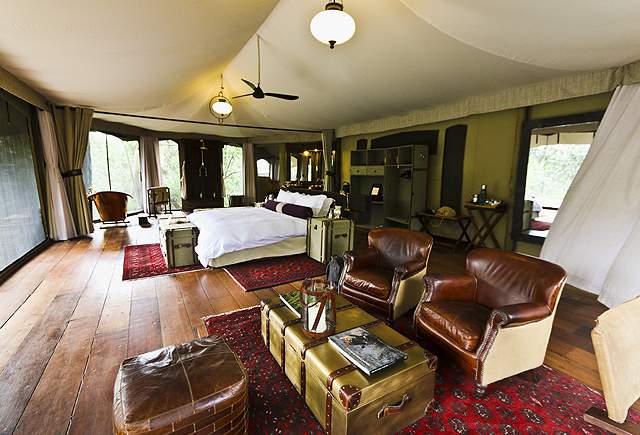
Different safari camps have different levels of amenities, from luxury to budget, and you need to figure out which ones you can’t live without, which would be nice, and which you don’t need.
There are several different types of lodging:
- Hotel-style: for those who don’t want a camping feel
- Glamping: luxury camping – basically 5 star amenities inside of a soft sided tent that can be as large as a small apartment)
- Camping: a small tent, with a bed, and usually an unattached, tented bathroom area)
Some places include laundry, drinks, Wi-Fi, and gourmet cuisine. Some do not. Some camps have fences, so the large animals cannot come up to the tents. Some camps are open and elephants may roam outside your tent at night.
3. Research companies
In Kenya, all safari companies need to be certified and licensed through the Kenyan Tourism Board. The Kenyan Tourism Board is a great place to start to get information on safari companies and to read about various places to visit. On their website, they have a list of different safari companies to check out, along with information on various regions, animals, climate and seasons, festivals, and so on. Read the website if you aren’t sure what you want or when to go.
In addition to the companies the KTB mentions, if you want high-class luxury safari’s, Abercrombie & Kent are a highly reputable company and considered one of the leaders in luxury travel.
4. Check out the types of vehicles offered.
There are many types of safari vehicles, so make sure the camp you pick offers the vehicle style you want. There are 3 main types of safari vehicles:
- Enclosed jeeps with full, metal sides and windows you look out of (great if you are not totally comfortable with being open to nature).
- Open-roof jeeps which have metal sides but an open roof (sometimes covered, sometimes not) you can stand up and look out through.
- Open-sided jeeps (no metal sides), covered or open tops, and canvas walls that can be rolled down if it rains.
Some open-sided jeeps come with arm rests and bean bags for camera stabilization (great if you are a photographer), while some do not. Know your comfort level being around animals and if you want to create photos or just create memories. Being in the right jeep for your travel style is very important. When booking, remember to request the style of jeep you want.
5. Conservancy or national park?
A conservancy is when a few small safari camps rent land from the local villagers, and this rented land makes up the conservancy. Only those few camps in the conservancy are allowed to drive on the conservancy land. There are many conservancies, each with their own set of rules, usually stricter than the national parks.
In national parks, there is no limit to the number of jeeps that can be at any animal sighting, and you must stay on marked roads. In conservancies, off-roading is allowed, but only a specific number (usually 2 to 5) of jeeps can be at any one sighting at a time.
Safaris affiliated with a conservancy are allowed to roam around their conservancy AND the national park, but safari’s associated with the national parks are ONLY allowed to roam on the national park land.
6. How many places do you want to see?
It is advisable to visit 2 to 3 different camps and/or geographical areas during your safari. By moving around, you have a better opportunity to see various animals, cultures, and experience different camps and guides.
Many people mix up camp levels and regions (and sometimes countries) for their safari dream trip, so always ask about this option. If you are on a limited budget, spending the first part of your trip in budget camps and ending with a night or 2 stay in luxury accommodations is popular. However, if you want to book one place and not move the whole time, that is perfectly fine, too.
It is your safari. Do what you want!
Booking your safari
After you have decided your budget, where you want to go, and what you want to see, it is time to book your safari.
1. Learn how to book your safari.
Some safari’s you can book directly through the camp. Others use 3rd-party booking agents. The Kenya Tourism Board website has a list of booking agents they work with.
If you find a specific camp you love, the easiest way to know how to book that camp is by calling the camp directly. They will tell you exactly how to book your stay with them.
If you don’t want to do the legwork, call up one of the companies listed on the Magical Kenya website, tell them your needs, wants, and budget. The booking agent will do all the work for you.
2. Does your booking include flights to Kenya?
If you are booking directly through a camp, flights to Kenya are not included. However, some booking agents can also book your flights. The cost of flights is not part of the safari cost, so talk with your booking agent up-front and ask about the cost of flights to Nairobi.
Booking your flights to Kenya with an agent also means that if a flight is delayed for any reason, the agent already knows and can make any adjustments to transfers and lodging before you arrive in Kenya. Less stress= happy safari.
3. Ask about transfers to and between camps
This is another reason booking agents are good. Some camps include pickup from the airport and airport transfers in the cost of the safari, but some don’t. By using an agent, you will know these costs (if extra) up front.
Ask if the transfers are by ground or air, and if there is a cost difference between the two. Make sure you know exactly where to go or who to look for upon arrival in Nairobi. There will likely be multiple tour companies (and sometimes multiple contacts from the same company) awaiting guests at the Nairobi airport. Always make sure you know exactly who to look for.
You should receive this information when you book your safari, but make sure you have a printed and a digital copy, the name and number of your booking agent, a Kenyan contact, and camp(s).
4. Understand the payment.
Make sure you understand exactly how to pay for your safari. There is usually a deposit, which may or may not be refundable, and then payments to be made on a schedule. You could be asked to pay the whole cost upfront. Make sure you understand the payment, what is and isn’t refundable, and exactly when you have to pay each amount (if using a payment plan).
If there is ever an issue, contact the booking agent or camp as soon as possible.
5. Don’t forget to ask about extras
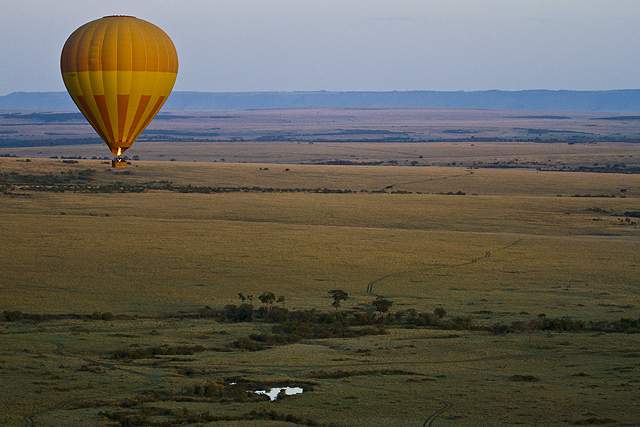
Ask your booking agent or camp about available extra excursions! Maybe you want to take a dawn hot air balloon ride over the Mara and finish up with a breakfast on the plains. Maybe you want to visit a local village. Perhaps you want to experience local cuisine one of nights.
It’s always better to ask about these when you are booking, but if you forget (or end up having more money for your trip than expected), ask as soon as you get to the camp. Some of these activities may cost extra, some maybe be included or added on for free. Always ask to make sure you get the best experience you can!
Before you leave
When you are getting ready to go, there are a few things to make sure you have.
1. Malaria medicine and vaccines.
You will need malaria medicine in Kenya. Kenya, outside of Nairobi, does have malaria and has virulent strains of it. They also recommend certain vaccinations like typhoid, Hep A and B, and yellow fever. If you are traveling from certain countries (like the USA), you don’t need to show Yellow Fever vaccination on arrival, but if you are coming to Kenya as part of a longer, RTW-type trip and are transferring to or from certain countries, you will.
Check the CDC website and ask your booking agent about their recommendations for vaccines and types of malaria medication. Typhoid isn’t as much of a problem if you are just eating in camps, but if you plan any time away from catering cooking (ex: you want to spend a few days in Nairobi eating street food), typhoid is recommended.
Find a travel doctor in your area and talk with them before you go.
2. Bug spray and lotion
Bug spray is your first defense against malaria, so make sure you bring some with you. Your travel doctor can recommend some and will probably have it for sale. Outdoor stores (like REI, EMS, and even Walmart) also sell various types of bug spray.
Lotion is also important as many places to safari in Kenya are in semi-arid climates. Even if you are from the southwest USA, the climate in much of Kenya is very dry, and you may be surprised to find out how much lotion is needed.
You don’t want to be distracted with dry, itchy skin instead of of enjoying the amazing animals!
3. Shower stuffs
Many camps have, and prefer, if you use their shower stuff (shampoo, conditioner, body wash). Especially in eco-camps, the toiletries they provide is formulated specifically to be non-harmful to the environment. However, if you have allergies or just prefer to use your own items, that is fine. But if you want to save on space and aren’t picky, ask if the camp supplies shower items.
4. Check the weather
Kenya has diverse climate systems, and it’s advisable to research the average temperatures and rainfall for the areas you will visit. Even though Kenya is on the Equator, elevation makes a huge difference in the temperatures. And because many places are semi-arid, there are drastic temperature changes between day and night (80F day and 50F night). It can be similar to Las Vegas or Arizona.
They also have rainy and dry seasons, so make sure you know the typical season for when you want to travel.
5. Clothing
Kenyans dress more conservatively than Americans and most other western cultures. There are large Muslim populations in some areas (like the coast), but even outside of these, and in large cities like Nairobi, you rarely will see women in tank tops or shorts or men in tank tops. You may also not be allowed to visit local villages unless you have at least a t-shirt and longer shorts (knee-length) on.
It is a good idea to bring a sweater, light jacket, long socks, long pants and t-shirts. Women may also want a longer skirt and scarf (to wear over your head), especially if you plan on visiting areas with high Muslim populations or religious buildings. When on safari, it is not a problem to wear shorts and tank tops (though you will likely get cold on the morning safaris), as safaris are geared towards tourists from around the world, but if you want to visit any villages or the coast, you should have more conservative clothing – if for no other reason than to be respectful of the Kenyan culture.
6. Passport and visas
Like traveling to almost any country, you must have a passport that is valid for at least 6 months and have 2 empty pages in your passport to enter Kenya.
You will also have to have a visa. Depending on your country, you may be able to get one at the airport (this is true for USA passport holders). A single entry visa for a USA traveler is $50 in new, not-torn US Dollars. (as of June 2014). There is a new East African visa coming out too, which allows travel between certain countries. Before you leave (and when you are planning) it is a good idea to make sure you know the visa requirements and the cost of them.
A Kenyan safari is an amazing experience that you will talk about for years to come. It is easier and cheaper than you think. If you have any other questions about safaris, you can contact the Kenyan Tourism Board. They are more than willing to help you with information so you can plan your trip of a lifetime.
Read more about planning an African safari and traveling around Kenya:
- The Nairobi Backpacker’s Experience
- Kenya for the Indie Traveler
- 7 Affordable Places to Go on an Africa Safari
- Kenya Indie Travel Guide
Photo credits: Pal Terviagimov, all other photos courtesy of the author and may not be used without permission.
